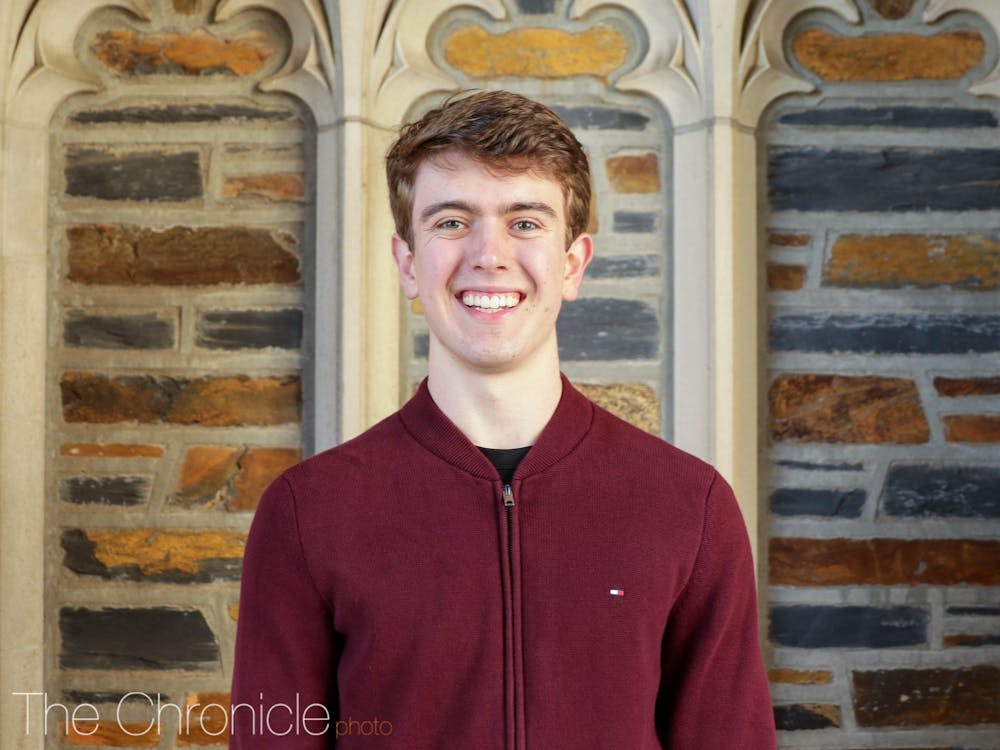Junior Jackson Kennedy, a candidate for Duke Student Government executive vice president, hopes to advocate for students in their academic pursuits and create a stronger, more inclusive university community.
The Durham native has served on DSG since he was a first-year and is currently a senator of academic affairs. Outside of his role as a senator, Kennedy tutors varsity athletes, is the structures lead in AERO Society, serves on the curriculum committee of the Arts & Sciences Council and is a member of the President's Athletic Council, where he was on the executive committee last year.
Kennedy worked during his earlier time as a senator to “bridge the gap” between the Pratt School of Engineering and Trinity College of Arts and Sciences. He created a house course, Engineering Basics for Trinity Students, to help Trinity students “see what engineering was actually like in a low pressure environment,” he said.
In his work in academic affairs, Kennedy recently pushed for students to get credits for teaching house courses and worked with faculty in hopes of getting Pratt to implement a satisfactory/unsatisfactory grading policy. Over the summer, he helped voice concerns for student-athletes who were worried about bringing COVID-19 home to their families during the school year.
Kennedy said that he has shifted to more “short-term, high impact” projects since his first couple years as a senator. He is working on developing a loaner laptop program which, if approved, will provide 60 laptops and 50 hotspots for low-income students in its first year and 30 new laptops per year after that for a permanent loan. According to Kennedy, the project is “part of a much bigger initiative to improve the low income first generation experience on campus.”
The laptop program is one example of Kennedy’s commitment to “respecting the values of equity and inclusion.” Last year, he delivered a speech in opposition to Duke Young Life, whose national organization includes a “homosexual lifestyle” as part of its sexual misconduct policy.
Kennedy also hopes to help “break barriers to entry” at Duke, noting that he wants to work on ways to combat students of marginalized identities from being discouraged from pursuing STEM majors. He proposed making introductory 101 courses graded on an S/U basis to prevent students from feeling weeded out from their interests.
Kennedy also mentioned that he wants to make the research of students and professors more accessible so that students can learn about things that interest them in deciding on a major and career path.
To make all campus resources more accessible, Kennedy hopes to create a centralized website for campus resources to get students to any resource they’re seeking in less than six clicks.
“I think Duke can really revolutionize students asking for help,” he said. “Things are often already there and just under-publicized.”
After working on the Blue Devil Buddies matching algorithm this summer, Kennedy wants to emphasize mentorship programs and wants to find ways to help Duke students, particularly first-years, feel connected by improving opportunities to meet people.
“I believe in relationships with people,” Kennedy said. “I have enjoyed being in different committees and meetings because you can create so much change by being able to speak up. Having those ideas at the start will do so much more with the butterfly effect later down than having to solve them retroactively.”
He also hopes to find ways to bring students with similar interests together. His ideas for this include having advisors meet with their students as a group, creating a program similar to FLUNCH for students and their teaching assistants, and having academically-focused mixers between or within majors.
“I’ve enjoyed working on these small, quick-fix projects, but I want to create monumental shifts at Duke that’ll create a much better undergraduate experience for all students,” he concluded.
Kennedy has served as a TA for Michael Gustafson, associate professor of the practice of electrical and computer engineering, for several semesters. Gustafson wrote in an email that as a TA, Kennedy would check in with students to see how they were doing and how the class was going.
He described Kennedy as “among the most joyful and hard-working people [he has] had the pleasure to teach, work with and learn from.”
“He is very thoughtful about what any possible change might mean for all students and has a strong understanding that his own personal experiences and background cannot form a broad enough foundation for a strong opinion, meaning he will reach out to others first,” Gustafson wrote.
Junior Meghna Mahadevan has worked with Kennedy on several of his efforts, including S/U initiatives, compiling the Academic Resource Guide and the house course.
Mahadevan recalled a time where Kennedy called her to ensure that his lesson plan for the house course was accessible and easy to understand for the students. She described him as “one of the most dynamic, passionate and driven people” she knows.
She lauded Kennedy for his selflessness, eagerness to develop relationships and love of learning, adding that Kennedy can be a “tenacious, fervent advocate for an equitable, connected undergraduate experience.”
“[Kennedy] is someone who genuinely gets so excited about Duke,” she wrote. “Whether it be about improving the student experience, talking about his course of study, basketball, whatever it is, his eyes light up when someone asks him to help them navigate Duke and make it the best possible experience for themselves.”
Get The Chronicle straight to your inbox
Signup for our weekly newsletter. Cancel at any time.

Leah Boyd is a Pratt senior and a social chair of The Chronicle's 118th volume. She was previously editor-in-chief for Volume 117.

